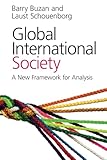Global international society: a new framework for analysis
Material type: TextPublication details: Cambridge University Press 2018 CambridgeDescription: xi, 276 p. Includes bibliographical references and indexISBN:
TextPublication details: Cambridge University Press 2018 CambridgeDescription: xi, 276 p. Includes bibliographical references and indexISBN: - 9781108448352
- 303.482 B8G5
| Item type | Current library | Collection | Call number | Status | Date due | Barcode | Item holds | |
|---|---|---|---|---|---|---|---|---|
 Book
Book
|
Ahmedabad General Stacks | Non-fiction | 303.482 B8G5 (Browse shelf(Opens below)) | Available | 200380 |
Table of Contents
1. Theorising international society
2. The making of contemporary global international society: how do international societies grow/expand?
3. The 'like-units' model
4. The regions/subglobal model
5. The hierarchy/privilege model
6. The functional differentiation model
7. Aggregating the models: the complex differentiation of contemporary global international society
Conclusions.
This ambitious book provides a new framework for analysing global international society (GIS). In doing so, it also links the English School's approach more closely to classical sociology, constructivism, liberal institutionalism, realism and postcolonialism. It retells the expansion of international society story to explain why the differences among states are as important as their similarities in understanding the structure and dynamics of contemporary GIS. Drawing on differentiation theory, it sets out four ideal-type models for international society. These cover the 'like units' of the classical English School, as well as differentiation by geography, hierarchy/privilege, and function. These models offer a systematic way to integrate international and world society, and to understand the relationship between the deep structure of primary institutions, and the vast array of intergovernmental and international non-governmental organisations. In this pioneering book, Buzan and Schouenborg present the reader with the first systematic attempt to define criteria for assessing whether international society is becoming stronger or weaker.
•
• Makes the first systematic attempt to define criteria for assessing whether international society is becoming stronger or weaker
• Provides a single framework for thinking about international and world society together, and for linking primary and secondary institutions
• Sets out a history of global international society that shows how it produced diversity as well as likeness amongst the units
• Uses differentiation theory to offer four ideal-type models to capture the full complexity of how global international society is composed and structured
https://www.cambridge.org/gb/academic/subjects/politics-international-relations/international-relations-and-international-organisations/global-international-society-new-framework-analysis?format=PB
There are no comments on this title.

